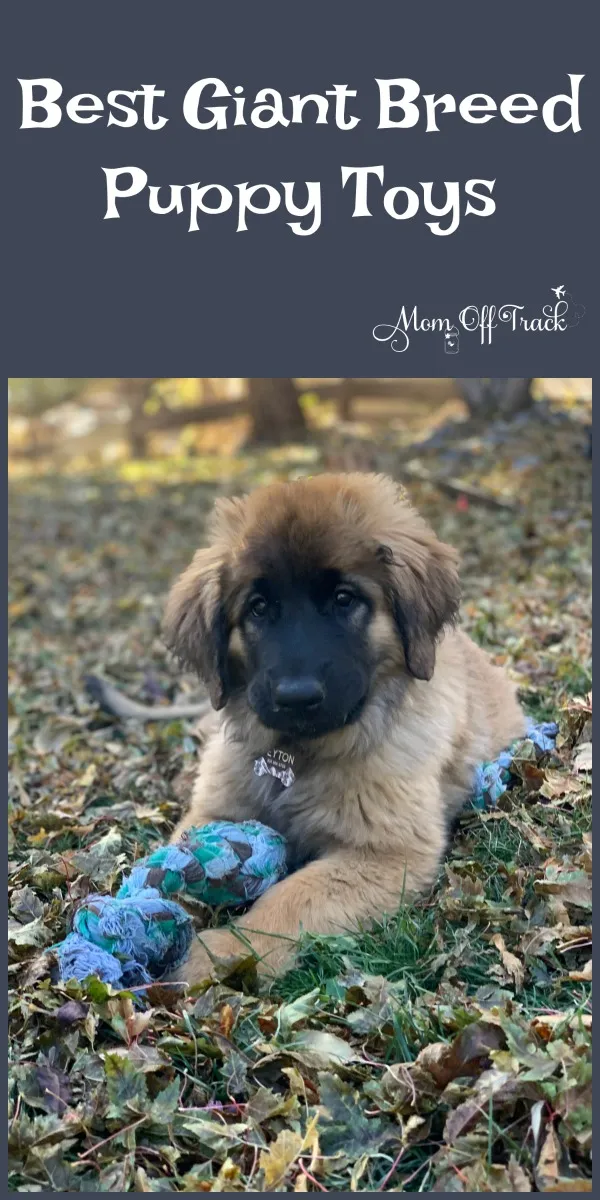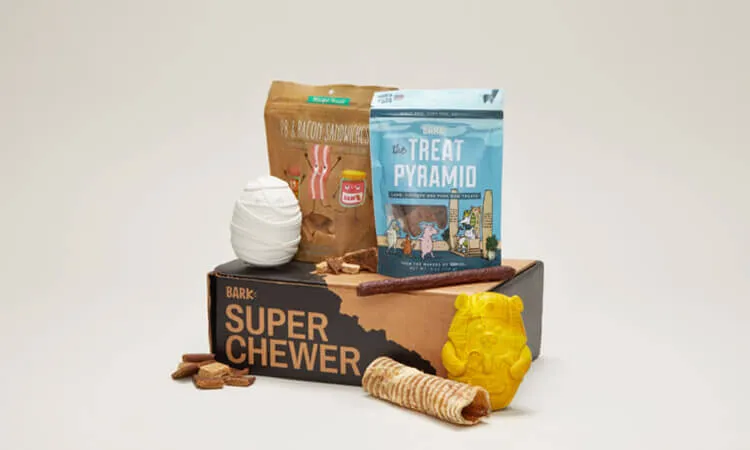Bringing a large breed puppy into your home is an incredibly rewarding experience, but it comes with unique challenges, especially when it comes to finding durable and appropriate chew toys. Breeds like Leonbergers grow at an astonishing rate, often doubling their weight in just a couple of months. An eight-week-old, 20-pound pup can easily weigh 40 pounds by 15-16 weeks! This rapid growth, combined with powerful jaws and a natural urge to chew, means that regular puppy toys simply won’t last. Investing in the right chew toys is crucial for their development, dental health, and your peace of mind.
Our family has extensive experience with Leonbergers, and with our newest pup, Peyton, we embarked on a fresh search for the ultimate chew toys and supplies for giant breeds. After thorough research and testing these items in our own home, we’ve compiled a list of Peyton-approved products that have stood up to the challenge for the first few months and beyond. Whether you’re a seasoned giant breed owner or welcoming one for the first time, these recommendations are designed to help you navigate the energetic chewing phase with confidence. Finding best toys for 5 month old puppy can be a constant quest, and the right toys ensure they’re happy and healthy.
The Importance of Durable Chew Toys for Growing Giants
Large breed puppies possess incredible strength and a powerful need to chew, which is essential for their dental health, jaw development, and to relieve boredom and anxiety. Without appropriate outlets, they’ll turn to your furniture, shoes, or anything else they can get their mouths on. That’s why investing in high-quality, durable chew toys isn’t just a luxury; it’s a necessity. These toys must withstand rigorous chewing and be safe, preventing choking hazards or ingestion of harmful materials. Choosing the right toys means providing mental stimulation and promoting positive chewing habits from an early age.
 A large, fluffy Leonberger puppy looking intently at a sturdy chew toy
A large, fluffy Leonberger puppy looking intently at a sturdy chew toy
Bully Stick Holders: A Safer Approach to a Puppy Favorite
Bully sticks are a widely recognized treat that dogs absolutely adore – often referred to as “doggy crack” in some circles. However, they come with a significant choking risk. The last small piece can easily become lodged in your puppy’s throat or cause digestive issues if swallowed whole. For Peyton, we found a brilliant solution: a bully stick holder. We initially purchased two, a large one for our adult Leonberger and a medium for Peyton. While the large one didn’t hold up to our older dog’s determined efforts, the medium holder has been perfect for Peyton. She hasn’t been able to remove the stick, and the toy itself has proven remarkably durable. It provides a safe way for her to enjoy her favorite treat, and she even loves playing with the holder when it’s empty.
Kong Toys: Tried-and-True for Power Chewers
Kong has long been a leader in creating some of the best Chew Toys For Large Breed Puppies and adult dogs, and for good reason—their products consistently stand the test of time. Despite some of their “puppy” sized toys appearing small initially, they remain perfectly appropriate for Peyton’s mouth and puppy teeth even at four months old, showing minimal signs of wear. We anticipate she’ll continue to enjoy them for several more weeks. Instead of using commercially available spray stuff, we prefer to stuff Kong toys with a tiny bit of all-natural peanut butter, providing a safe and engaging treat that keeps her occupied. For other excellent options, consider exploring best chew toys for corgi puppies for more inspiration on durable choices.
Kong Puppy Goodie Bone
This bone is a fantastic option for puppies, designed with a patented “Goodie Gripper” that allows you to stuff it with treats, encouraging extended play and mental engagement. Its natural rubber construction is gentle on puppy teeth but tough enough to endure.
Kong Stuff-a-Ball
The Stuff-a-Ball is another innovative Kong product that combines chewing satisfaction with treat dispensing. Its unique design holds treats securely, making your puppy work to get them out, providing a challenging and rewarding experience.
Kong Dental with Rope
Combining the benefits of a chew toy with dental cleaning, the Kong Dental with Rope features grooves that help clean teeth and gums as your puppy chews. The added rope provides an extra element for tugging and interactive play.
Classic Kong Puppy Toy
The iconic, bouncable Kong Puppy toy is specifically designed for growing teeth and jaws. Its unique shape provides unpredictable bounces, making playtime exciting, while its hollow center is perfect for stuffing with treats to keep your puppy engaged for hours. For the youngest pups, exploring best toys for 2 month old puppy might offer additional suitable options.
Interactive Puzzle Toys to Engage Their Minds
Large breed puppies eat a significant amount of food, and interactive toys are excellent for keeping their minds busy while slowing down mealtime, which can also help prevent issues like bloating. These puzzle toys are perfect for mental enrichment. While our breeder highly recommended the first one, Peyton loves both equally. She didn’t show much interest until around three months, but now they are her absolute favorites and will continue to be useful well into adulthood. Even our older Leonberger occasionally enjoys a chew, proving their long-term appeal. It’s also important to note that even best small dog toys for chewers can offer insights into durable materials and designs suitable for strong chewers, albeit in a different size category.
Planet Dog Orbee-Tuff Snoop
This durable, translucent toy requires your puppy to nudge, sniff, and paw to get treats out, providing an excellent mental workout. It’s made from a tough, pliable material that stands up to chewing.
Interactive Dog Ball Treat Dispenser Game
Another fantastic option, this treat-dispensing ball encourages problem-solving skills as your puppy learns to manipulate it to release kibble or treats. It’s a great way to combine mealtime with playtime, promoting slower eating and reducing boredom.
Super Chewer Subscriptions: A Monthly Treat for Big Puppies
Beyond the individual toys we’ve found, investing in a Super Chewer subscription from Bark Box has been a game-changer. Both Peyton and our older dog, Sophie, absolutely adore the treats, and we appreciate that they are healthier, often single or two-ingredient options that are difficult to find elsewhere. We recommend starting with the medium-sized toys and gradually moving up to larger ones as your puppy grows. Receiving a new themed box each month is exciting for both us and our pups, and their customer service has always been exceptional.
 A subscription box for super chewers with a variety of durable toys and treats
A subscription box for super chewers with a variety of durable toys and treats
Essential Gear Beyond Toys for Your Large Breed Puppy
While chew toys are paramount, several other supplies are crucial for raising a large breed puppy. These foundational items contribute significantly to their comfort, safety, and training.
Durable Puppy Beds
The faux fur PupRug bed is an excellent investment. While a bit large for a young puppy, its waterproof and washable design ensures longevity. Knowing it will be the perfect size for them as adults makes it a valuable, long-term purchase. We now have two!
Crate Training Essentials
Crate training is a vital part of raising a well-adjusted puppy, especially for giant breeds. Our Midwest double-door XL crates with dividers have lasted through several Leonbergers, proving their durability and utility. They are a crucial investment for safety and training. To make crate training more comfortable and hygienic, we discovered washable crate mats that saved our sanity during the initial weeks. We purchased four (40×26 inches) to ensure a constant supply of clean bedding for the XL crate. For additional useful information, considering best toys for 8 week old puppy can help ensure you’re prepared for your puppy’s earliest days.
Slow Feeder Bowls for Bloat Prevention
Bloat is a serious concern for many giant breeds, often exacerbated by rapid eating. A slow feeder bowl is an inexpensive yet highly effective tool to mitigate this risk by forcing your puppy to eat at a more measured pace. This simple change can make a significant difference in their long-term health.
Conclusion
Selecting the right chew toys for large breed puppies is an essential part of responsible pet ownership. By prioritizing durable, safe, and mentally stimulating options like those from Kong, specialized bully stick holders, and interactive puzzle feeders, you can help your growing giant develop healthy chewing habits and stay entertained. Don’t forget the importance of other crucial supplies like durable beds, crates, and slow feeders to support their overall well-being. These investments will contribute to a happy, healthy, and well-adjusted companion for years to come. Enjoy every moment; they truly don’t stay little for long!
